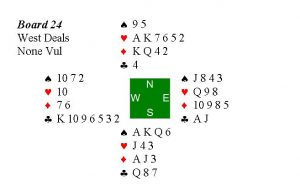

During the auction the bidding became confusing at one point but the non-offending pair were not damaged as a consequence.
1 (a) Alerted as a splinter by N but intended by S as Gerber.
2 (b) (Based on a splinter) N correctly signed off in 4♥
3 (a) Wishing to press on with a slam enquiry anyway, S bid 4NT (RKCB). Although N wanted to sign off in 4♥, it made no difference whether S interpreted N’s bid as (i) a sign off, or (ii) 1 key card. Either way, with such a strong hand, S was determined to press on. Since his previous bid had been read as a splinter, 4NT was used to clarify the situation to everybody.
(b) To correct the misinformation she had given previously N then advised EW that “the 4♣ bid by S had clearly not been a splinter”, and accordingly N bid 5♥ (2 key cards). N went out of her way to try to clarify the situation which arose from the mis-information which she had given due to a misunderstanding of the 4♣ bid from S.
4 Missing only one key card in partnership and with a strong point count, S took a calculated risk and raised to 6♥. Careful play by North resulted in making a small slam.
There is not a shred of evidence that EW were in any way damaged by the error during the auction. Quite the contrary: in fact they gained authorised information that S did not have either 1st or 2nd round control in clubs.
N inadvertantly gave mis-information but EW were not damaged in the slightest (they had very few points and didn’t bid at all), but NS had their slam cancelled. In fact EW gained slightly from N’s subsequent clarification of her interpretation of the 4♣ bid from S, because EW would then know that S didn’t hold first or second round control in clubs. Such information would have been unavailable to them without N’s clarification. We believe that the NS slam should be allowed without adjustment.
Mike Ingle – Oswestry
Firstly have East/West been damaged by the incorrect explanation of the 4♣ bid (assuming that systemically it is Gerber and not a splinter)? Possibly West would double for a club lead (I would), he’s less likely to do so if 4♣ is a splinter), and on a club lead from East the slam can never make. West would state that he would ‘obviously’ double. At the time, the Director should have asked West what he would do if told it was Gerber.
As regards unauthorised information between North/South, a convenient way to deal with situations like this is to imagine a communication wall between North/South, where only the actual bids can be seen (this is the situation when using screens at higher level bridge). Remember that alerts are only there for the opponent’s benefit, not for partner, so in this approach North/South don’t hear/see any alerts or explanations (or grimaces) from partner.
In this case seeing only the bidding cards, I don’t think that anything has gone amiss as regards UI. It’s fortunate that North’s 4♥ response is the same whether as a sign-off or a Gerber response. The 4NT bid doesn’t actually mean anything when playing Gerber, so North is entitled to assume whatever he likes. The slam is still reached.
Note that in the latest Laws (2017), North can correct his own mistaken explanation when he realises it (but he is under no obligation to do so), so no infraction from North, other than he should call the Director before making his correction statement.
The Director now has to solely consider the effect on East/West’s bidding/play of the original mis-explanation. Why didn’t East lead his ♣A? There are two schools of thought – some always lead an ace, others not. However if West doubles South’s Gerber bid, East would certainly lead the ♣A.
So how do we proceed? The crux of the matter is whether West would double the 4♣ bid. The Director should ask West what he would have done if the 4♣ is described as Gerber. (The Director must not make suggestions to West – it is West’s decision). If he says he wouldn’t double – result stands. If West says he would definitely double, I would first ask why he didn’t say at the time, but if I believed his explanation , I would rule 6♥ one off (East would now be bound to lead ♣A). If West says he might double (in which case East would lead C♣), I would award a weighted score of possibly 40% making 6♥, 60% 6♥ – 1, but your Director may alter the detail percentages.
So I don’t think you are fully correct in saying opponent’s haven’t been damaged (as explained above), so if you appeal be careful howyou approach it – you think the Director should have taken all the above points into consideration (probable outcome – the weighted score as detailed above if the Director believes that West may double 4♣ – but as I said above it’s all based on the probability of West doubling).
Weighted Scores:
If using PairsScorer, on the ‘Scores’ screen, use the panel mid-right. In the ‘%’ column enter the appropriate percentage (this would be ‘40%’). In the next column enter ‘980’ (6♥ making). In the final column use the drop-down to choose ‘both’ (its very rare that anything other than ‘both’ is chosen – only in split score situations). On row 2, enter ‘60%’, ‘-50’ (6♥-1), ‘both’. Then on the screen traveller enter ‘W’ (for weighted) in the score column. The display will then indicate an artificial score.
If using Scorebridge, sorry but I’ve no idea how you handle a weighted score.
Tony